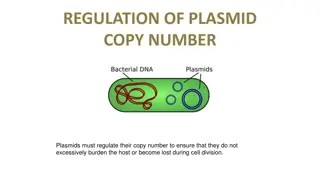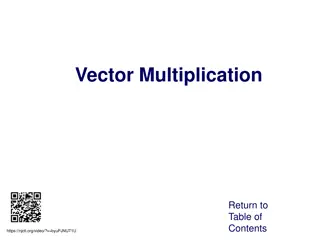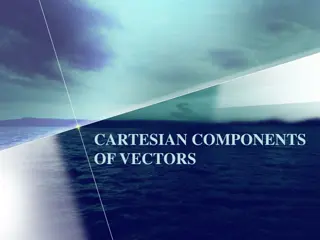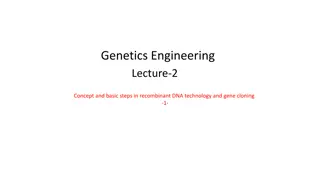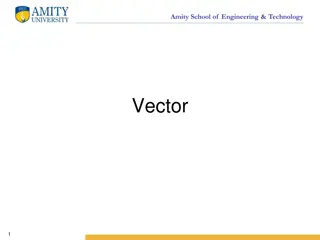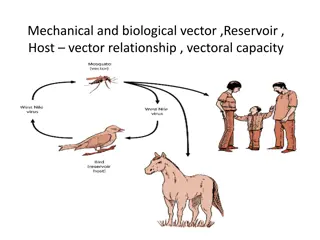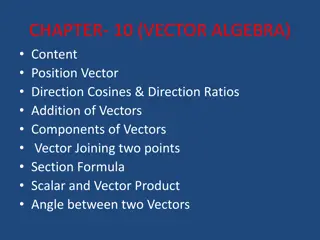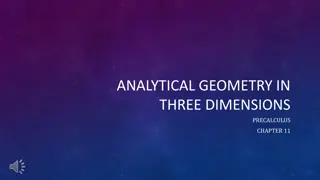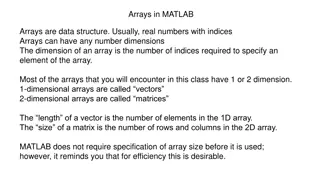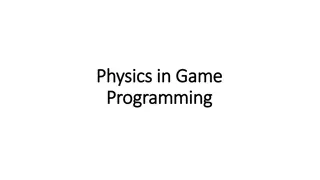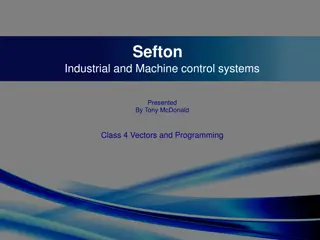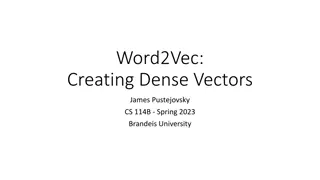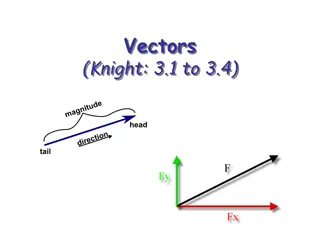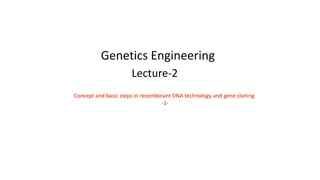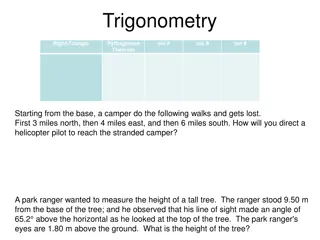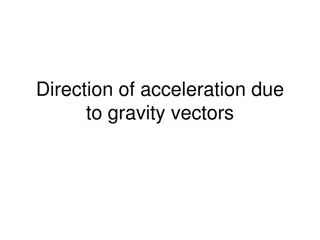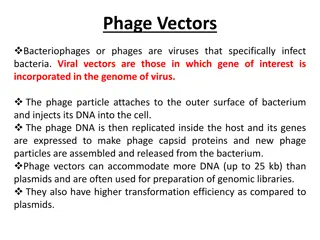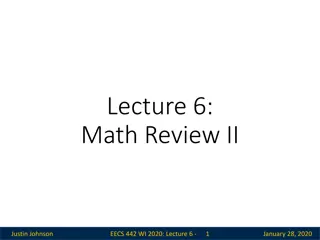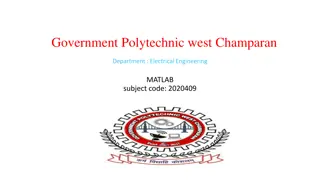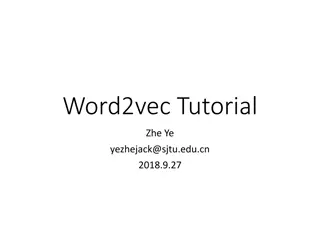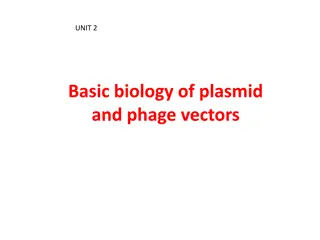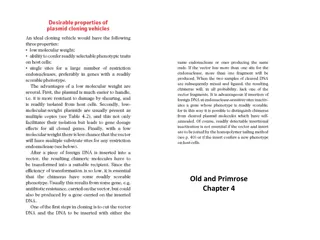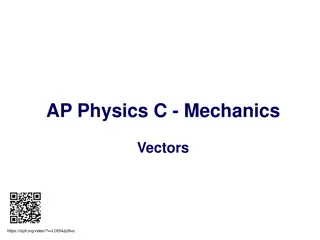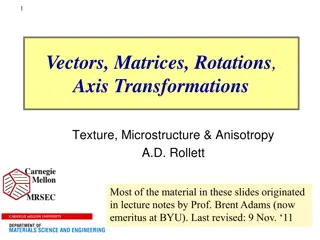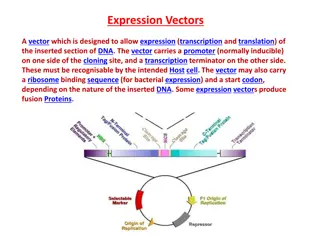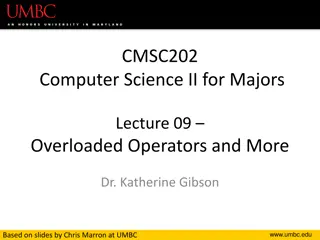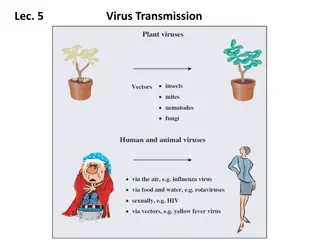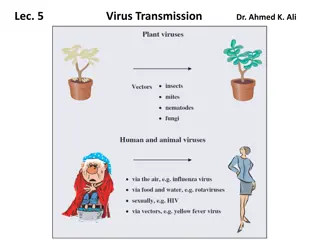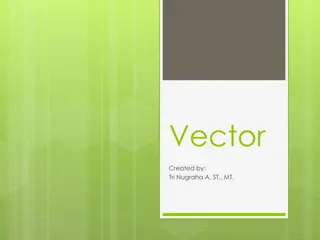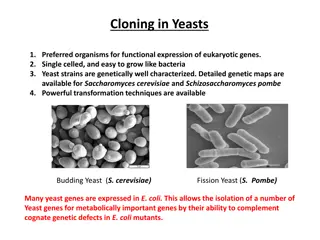Understanding Viral Vectors in Gene Delivery: Safety and Considerations
Exploring the mechanisms of gene delivery via viral vectors, this content delves into the basics of viral structure, infection, and replication. It discusses common viral vector systems like Adenoviral and Lentiviral vectors, highlighting safety considerations and the production processes involved.
1 views • 19 slides
REGULATION OF PLASMID COPY NUMBER
Plasmids regulate their copy number to maintain a balance that doesn't burden the host cell. Copy numbers vary based on factors like plasmid size and culture conditions. Plasmids are classified as stringent or relaxed based on replication control. Various systems, including counter-transcribed RNAs
4 views • 17 slides
Understanding Normed Vector Spaces for Nanotechnology Engineering
Introduction to normed vector spaces, focusing on defining norms for vectors in finite-dimensional spaces, exploring different ways to measure vector length, and understanding the concept of unit vectors and norm properties. This topic equips readers with the ability to calculate vector norms, norma
0 views • 9 slides
Vector Multiplication
Learn about vector multiplication, unit vectors, magnitude calculations, scalar dot products, cross products, and angle determinations between vectors. Explore video explanations and visual representations for a comprehensive understanding of vector mathematics concepts.
0 views • 11 slides
Introduction to Cartesian Components of Vectors in Two-Dimensional Space
Exploring Cartesian components of vectors in a two-dimensional coordinate frame using unit vectors i and j. Learn how to express vectors, add them using the triangle law, use column vector notation, and find resultant vectors. Understand position vectors in terms of coordinates. Examples and diagram
0 views • 16 slides
Understanding Plasmid Partitioning Mechanisms in Bacteria
The stable maintenance of low-copy-number plasmids in bacteria relies on partition mechanisms that ensure proper positioning during cell division. Different from high-copy-number plasmids, which rely on random diffusion, low-copy-number plasmids require regulated partitioning mechanisms to prevent d
0 views • 14 slides
Understanding DNA Cloning with Filamentous Coliphages
Filamentous coliphages M13, f1, and fd are utilized as cloning vectors due to their circular single-stranded DNA molecules and advantages over other vectors. These phages have dimensions of 900 nm x 9 nm and infect bacteria through F pili, releasing up to 1000 phage particles per cell per generation
0 views • 17 slides
Understanding Recombinant DNA Technology and Cloning Vectors in Genetics Engineering
Exploring the fundamentals of recombinant DNA technology and gene cloning, this content delves into the key concepts and basic steps involved. It covers various cloning vectors such as plasmids, bacteriophages, and artificial chromosomes, highlighting their common features and applications in geneti
0 views • 12 slides
Understanding Amity School of Engineering & Technology Vectors in Java
Amity School of Engineering & Technology Vectors provide a flexible way to manage dynamic arrays in Java programming. With capabilities to store objects of any type and accommodate dynamic resizing, these vectors offer optimized storage management through capacity and capacity increment settings. Co
0 views • 18 slides
Vector Relationships and Pathogen Transmission
Understanding mechanical and biological vectors, reservoir hosts, and their role in disease transmission is crucial for effective disease control. Mechanical vectors like flies can transfer pathogens without getting infected, while biological vectors like mosquitoes carry pathogens that reproduce in
1 views • 5 slides
Understanding Vector Algebra and Its Applications
Explore the fundamentals of vector algebra, including position vectors, direction cosines, direction ratios, vector addition, scalar product, vector product, and more. Learn about the dot product, cross product, and the angle between two vectors. Visual aids and examples help clarify key concepts in
0 views • 18 slides
Exploring Three-Dimensional Geometry in Precalculus
Delve into the world of analytical geometry in three dimensions with a focus on plotting points, calculating distances and midpoints, graphing spheres, and understanding vectors in space. This chapter covers essential concepts such as 3D coordinate systems, equations of spheres, vector operations, a
0 views • 29 slides
Understanding Arrays in MATLAB for Efficient Data Handling
Explore how arrays in MATLAB are used to store real numbers with indices, including vectors and matrices. Learn about row and column vectors, vector input to MATLAB functions, and the efficient usage of for loops for handling data effectively within arrays.
1 views • 8 slides
Understanding Transgenic Plants and Agrobacterium Tumefaciens in Plant Biotechnology
Creation of transgenic plants involves various methods such as microprojectile DNA-coating, electroporation, and Agrobacterium transformation. Agrobacterium tumefaciens, a soil bacterium, plays a crucial role in inducing crown gall disease in plants by transferring T-DNA from the Ti plasmid. The Ti
1 views • 27 slides
Understanding Vectors and Velocity in Physics and Game Programming
Exploring the concepts of vectors, velocity, and positional vectors in both physics and game programming. Learn about key properties, conversion formulas, and the application of velocity vectors to positional vectors using examples and visual representations.
1 views • 32 slides
Understanding Vectors and Motion Control Systems in Industrial Machinery
Vectors play a crucial role in machine control systems, particularly in programming and motion control. This article explores the concept of vectors, their application in two and three-dimensional machines, and their significance in physics. It also delves into the use of vectors for controlling mov
0 views • 6 slides
Understanding Word2Vec: Creating Dense Vectors for Neural Networks
Word2Vec is a technique used to create dense vectors to represent words in neural networks. By distinguishing target and context words, the network input and output layers are defined. Through training, the neural network predicts target words and minimizes loss. The hidden layer's neuron count dete
7 views • 12 slides
Exploring Vectors: Magnitude, Direction, and Operations
Delve into the world of vectors, understanding their properties, how to add and subtract them, and determining their components in different coordinate systems. Learn about scalar quantities, vector quantities, the tip-to-tail rule, and the role of unit vectors in calculations.
0 views • 19 slides
Understanding Cloning Vectors and Recombinant DNA Technology
Genetics Engineering Lecture-2 delves into the concept and basic steps of recombinant DNA technology and gene cloning, highlighting different types of cloning vectors like plasmids, bacteriophages, bacterial artificial chromosomes, yeast artificial chromosomes, and mammalian artificial chromosomes.
1 views • 13 slides
Trigonometry and Vector Illustrations in Physics
Explore applications of trigonometry and vectors in solving real-world problems such as directing a helicopter pilot to a stranded camper, measuring the height of a tree, analyzing displacement vectors, and adding vectors using graphical and component methods.
0 views • 10 slides
Understanding Acceleration Due to Gravity Vectors
Discover the direction of acceleration due to gravity vectors for various scenarios such as a pebble dropped from a bridge, a baseball tossed up in the air, a football thrown at a 45-degree angle, and more. Explore how vectors can be represented to show both magnitude and direction, helping in visua
0 views • 18 slides
Understanding Four-Vectors in 4D Space
Explore the concept of four-vectors in four-dimensional space, covering topics such as radius vectors, general 4-vectors, contravariant and covariant components, summation conventions, scalar products, and the components of a general 4-vector. Learn how these vectors transform under rotations and Lo
0 views • 42 slides
Understanding Phage Vectors in Genetic Engineering
Phage vectors, utilized in genetic engineering, are bacteriophages capable of incorporating genes of interest into their genome. They have a higher DNA capacity compared to plasmids, making them ideal for creating genomic libraries. Bacteriophages like Lambda and M13 are commonly used for cloning ve
0 views • 17 slides
Understanding Math Fundamentals: Matrices and Vectors in EECS 442
Delve into the world of matrices and vectors with a focus on floating-point math, IEEE standards, vector operations, and matrix manipulation in the context of EECS 442 lectures by Justin Johnson. Explore foundational concepts such as concatenation, transpose, cross product, dot product, and the nuan
0 views • 58 slides
MATLAB Basics for Electrical Engineering Students
In this instructional content from the Government Polytechnic West Champaran Department of Electrical Engineering, students are introduced to the fundamentals of MATLAB. Topics covered include transposing matrices, concatenating matrices, matrix generators, arrays, entering matrices, and manipulatin
0 views • 48 slides
Understanding Word Vectors and Training with Gensim
Explore the differences between one-hot representation and word vectors, learn about virtual environments in Python for training word vectors, and dive into the process of evaluation, analogy, and word clustering. Discover tools like Anaconda and Virtualenv, popular libraries like Gensim, and the si
0 views • 16 slides
Basic Biology of Plasmid and Phage Vectors
Plasmids are replicons inherited extrachromosomally, existing as circular DNA molecules. They can be categorized as conjugative or non-conjugative based on transfer genes presence, and by copy number per cell. Linear plasmids and their maintenance mechanisms are also discussed, along with phenotypic
0 views • 13 slides
Understanding Recombinant DNA Technology and Plasmid Vectors
Explore the world of recombinant DNA technology through the utilization of plasmids as vectors for gene cloning. Learn about techniques like insertional inactivation and the characteristics of common plasmid vectors such as pBR322. Discover the intricacies of genetic manipulation in bacterial origin
0 views • 26 slides
Understanding Parasitic Helminths and Disease Vectors in Microbiology
Explore the world of parasitic helminths and disease vectors in microbiology. Learn about the classification of parasites, the life cycle of Ascaris lumbricoides, and the role of arthropods as agents and vectors of diseases in humans. Discover the characteristics of the three main groups of parasiti
0 views • 18 slides
Understanding Vectors in AP Physics C: Mechanics
Explore the fundamental concepts of vectors in AP Physics C: Mechanics, including scalar vs. vector quantities, vector operations, and vector multiplication. Discover the significance of vectors in explaining and predicting physical phenomena through graphical methods and mathematical equations. Div
0 views • 28 slides
Understanding Vectors, Matrices, and Rotations in Euclidean Space
Explore the fundamentals of vectors, matrices, rotations, and coordinate transformations in Euclidean space. Learn about points, tensors, and the significance of vectors in representing physical quantities. Discover the Parallelogram Law and Coordinate Frames for effective visualization and computat
0 views • 46 slides
Understanding Expression Vectors in Molecular Biology
Expression vectors are essential tools for gene expression studies, allowing for transcription and translation of specific DNA sections in host cells. These vectors contain key elements like promoters, terminators, and ribosome binding sequences for efficient protein production. Different promoters
0 views • 15 slides
Understanding Forces and Vectors in Statics with Air Balloon Models
Explore the world of forces and vectors in statics through the model of a hot air balloon. Learn about vectors of negative magnitude, zero, addition, subtraction, parallel and perpendicular components, and multiplying by a scalar. Discover how to find components and the resultant force of multiple f
0 views • 17 slides
Understanding Vectors in C++: A Comprehensive Overview
Dive into the world of vectors in C++ with this detailed lecture overview, covering topics like overloading operators, enumeration, and dynamic memory allocation. Explore the principles of least privilege and learn about access specifiers for class functions. Discover the flexibility and convenience
0 views • 51 slides
Vector Mathematics for Geometric Problem Solving
Learn how to use vectors to solve geometric problems, including finding position vectors of points dividing line segments in given ratios. Explore concepts such as position vectors, ratios, trigonometry, and Pythagoras' theorem to determine angles and side lengths in triangles using vector methods.
0 views • 9 slides
Understanding Virus Transmission via Vectors
Viruses must be transmitted to new hosts for their survival. This transmission occurs through vectors like arthropods, which acquire and transmit viruses during feeding. The mechanism involves viruses attaching to the vectors' mouthparts or entering their circulatory system to reach salivary glands
0 views • 14 slides
Understanding Virus Transmission via Vectors in Hosts
Viruses must be propagated and transmitted to new hosts for survival. They can be spread via vectors like arthropods, which acquire and transmit viruses during feeding. This transmission can occur quickly through the vector's mouthparts or more slowly via circulation in the vector's body. Plant viru
0 views • 14 slides
Understanding Malaria Vectors and Their Habitats
Explore the complex relationships between malaria vectors and parasites, highlighting the biology and life cycles of Anopheline mosquitoes. Discover the diverse species within the Culicidae family and their preferences in habitat, influenced by human activities. Gain insights into the genus Anophele
0 views • 47 slides
Understanding Vectors: Concepts, Operations, and Applications
Vectors are quantities defined by magnitude and direction, essential in various fields like physics and mathematics. Learn about vector properties, examples, operations like addition and multiplication, as well as applications such as understanding displacement, velocity, and acceleration. Dive into
0 views • 20 slides
Understanding Cloning in Yeasts: Vectors and Selectable Markers
Yeasts like Saccharomyces cerevisiae and Schizosaccharomyces pombe are valuable organisms for eukaryotic gene expression. They offer easy growth like bacteria and are genetically well-characterized. Yeast selectable markers and vectors enable efficient cloning and expression of genes. The use of shu
0 views • 16 slides

